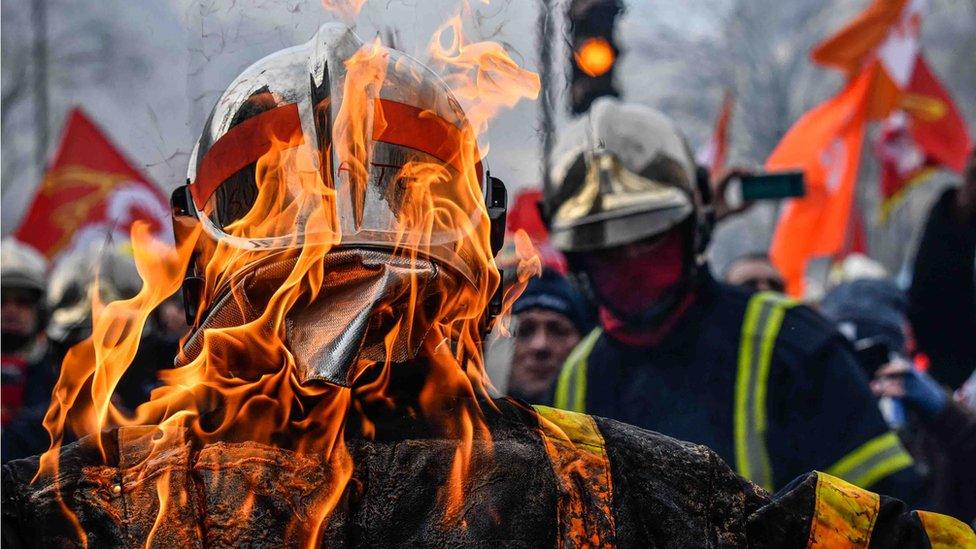France's Macron defies coronavirus lockdown with elections
- Published
French President Macron: "[Scientists] think nothing stands in the way of the French going to the polls"
Elections are usually risky for leaders, not for voters. But France's local elections this weekend have raised fears of a health crisis, not just a political one.
There has been feverish speculation here about whether holding the poll during an epidemic would be sensible.
The government has banned gatherings of more than 100 people, shut schools and universities and suspended big sporting events.
But despite labelling coronavirus France's "biggest health crisis in a century", President Emmanuel Macron confirmed this week that Sunday's vote would go ahead.
In the tiny town of Lamorlaye, an hour's drive north of Paris, mayor Nicolas Moula is upbeat.
"Information is the number one key," he says, opening the door to the polling station, in a low modern building behind the town hall.
Inside, it looks as if Lamorlaye is preparing for an agricultural show. There are metal railings creating closed lanes inside the room, and copious amounts of black-and-yellow striped tape on the floor.
"This is where we'll have the hand gel and gloves," he explains. "And here, these markers are to show voters where to wait in the queue, to stop them getting too close to the person in front."
More on Macron's France
The French government has issued guidelines to polling stations across the country, asking that people are kept at least a metre away from each other at all times. The interior minister even asked voters to bring their own pens, to avoid transmitting the virus that way.
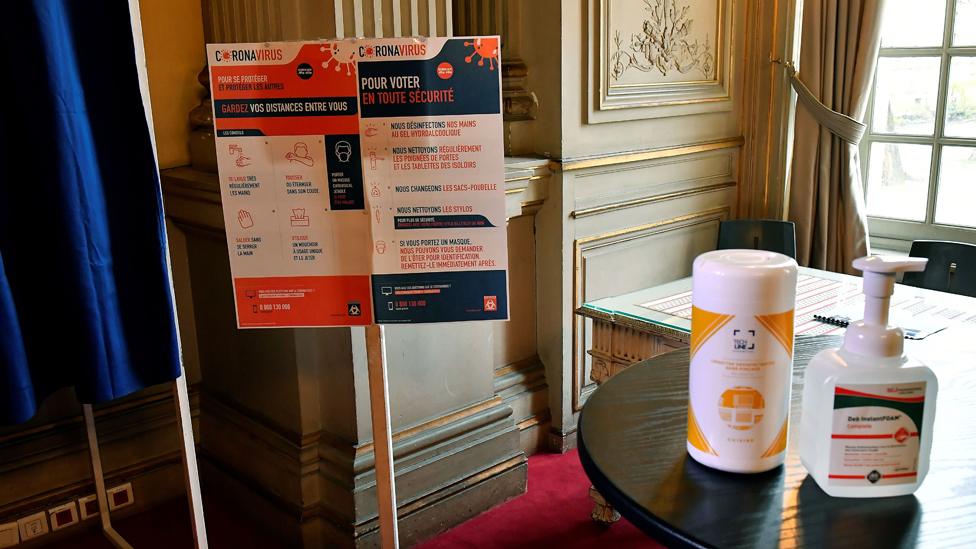
A polling station in Bordeaux - hand gel at the ready for voters
Lamorlaye is in the Oise region, one of the worst-hit by the virus so far. All social gatherings here have been banned, schools are closed, and people have been told to stay at home as much as possible.
Will people really want to come and vote?
"That's why we're reassuring everyone," says Mayor Moula, "by sending out leaflets explaining the procedures. There really isn't any risk."
One of France's biggest polling agencies suggested this month that almost 30% of French voters would avoid the election, for fear of catching the virus.
The government reportedly came close to calling it off. But President Macron appeared convinced that the poll could be held safely - at least, when it comes to public health.

LIVE UPDATES: Borders shut as coronavirus cases rise
EASY STEPS: How to keep safe
A SIMPLE GUIDE: What are the symptoms?
GETTING READY: How prepared is the UK?
TRAVEL PLANS: What are your rights?

How safe his party will be in the nation's polling stations is another question.
This election is the latest political duel between the liberal president and his far-right nationalist rival, Marine Le Pen.
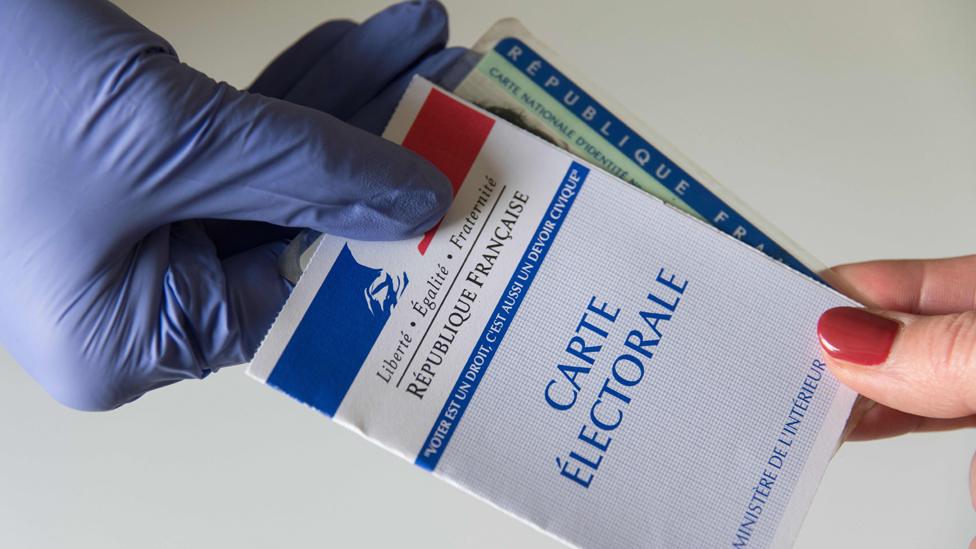
Ms Le Pen's party, National Rally, is hoping to hold on to the eight town halls it currently holds, and also has its eye on winning its first big city, Perpignan.
Close race for Paris
Mr Macron's party, La République En Marche (LREM), was newly-created four years ago and is contesting local seats here for the first time.
It's locked in a headline race for Paris, against the Socialist incumbent, Anne Hidalgo, and a centre-right candidate, Rachida Dati.
The original candidate for the president's party, Benjamin Griveaux, was forced to quit last month after a sex scandal. He was replaced by France's former health minister, Agnès Buzyn.
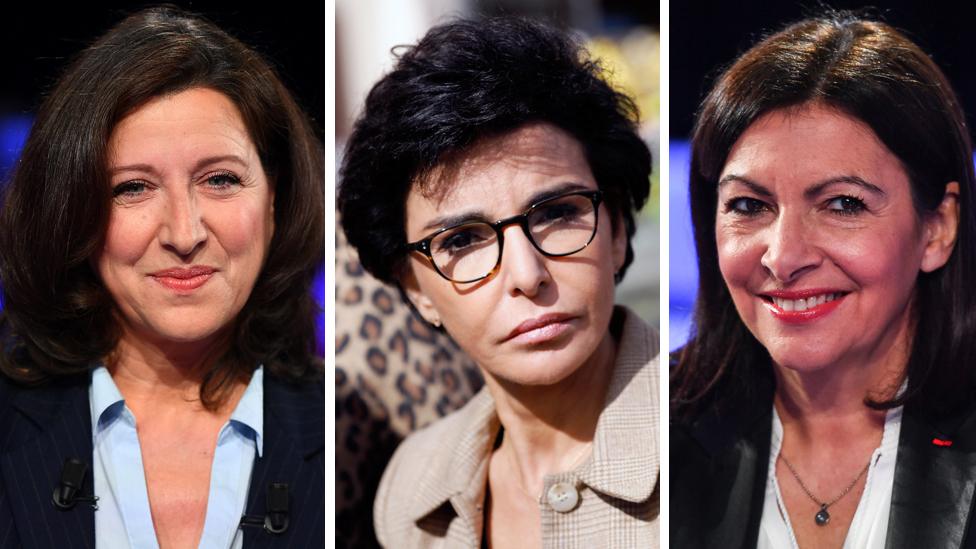
Paris mayoral rivals (L-R): Agnès Buzyn, Rachida Dati and the incumbent, Anne Hidalgo
Out of the frying-pan of coronavirus, into the fire of local politics, some might say.
Anne Hidalgo is currently ahead in the polls by a few points, despite her divisive strategy for an eco-revolution in Paris, which has already seen roads dug up to make bike lanes, and part of the riverside in Paris closed to vehicles.
Paris has been left-wing for almost 20 years, but the conservative Rachida Dati is thought to be a real challenge this time, with her promise of a cleaner, safer city, with more housing and better transport.
Many believe LREM could be heading for a loss in Paris, predicted by one French paper as "modest at best, humiliating at worst".
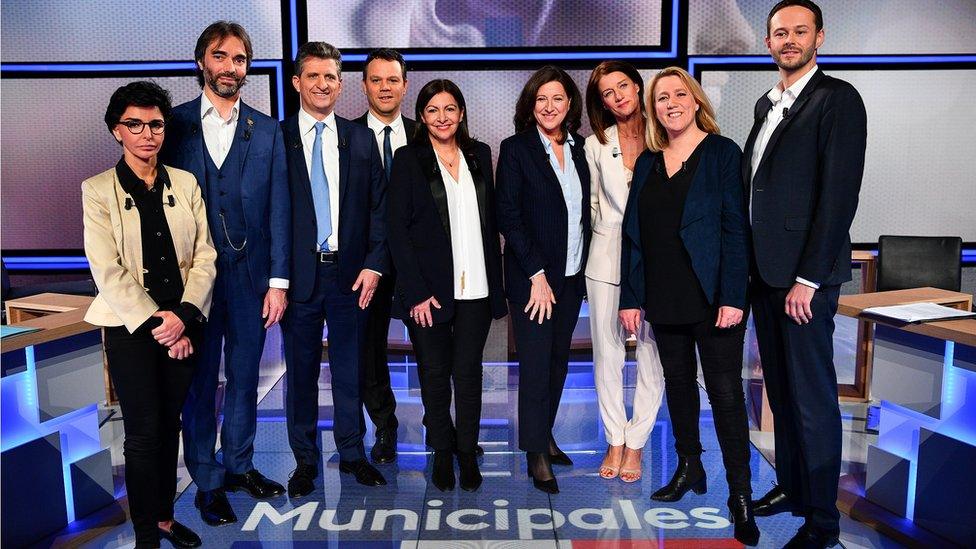
A crowded field of candidates took part in the final debate this week for the Paris mayoral elections
France's two-round voting system means LREM should have a second chance at the run-off polls a week later.
The interesting question will be whom the party aligns with between the two rounds. An alliance with Rachida Dati could play into the president's image as a centre-right liberal who's abandoned the left-wing part of his base.
Away from Paris, this election is a chance for the president's party to begin putting down roots across the country. The fear is that it'll be a chance for coronavirus to do the same.
Second chances are part and parcel of French politics. Not so much global pandemics.
- Published17 February 2020
